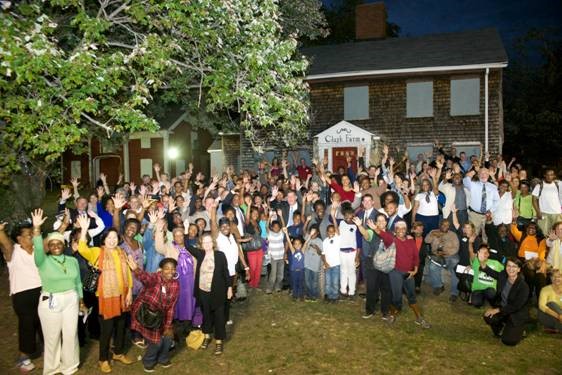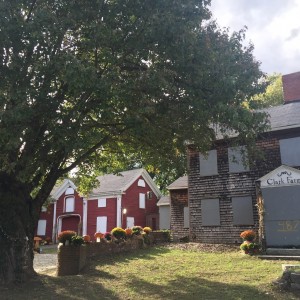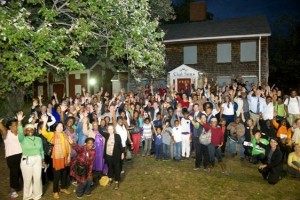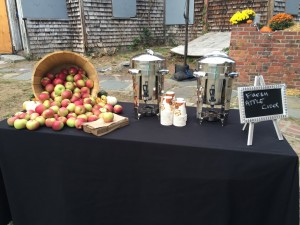
September 29, 2015 Mayor Walsh Announces Plans for Historic Fowler Clark Epstein Farm in Mattapan
On Monday evening Boston Mayor Martin J. Walsh joined Historic Boston Inc., The Trust for Public Land, the Urban Farming Institute of Boston, North Bennet Street School, city officials and the Mattapan community to announce the $3.2 million historic restoration of the 18th-century Fowler Clark Epstein Farm into a working urban farm, farmer housing and educational training center.
The fervor of excitement that has ignited over the past few weeks attracted a crowd of around 250 people to the farm site on 487 Norfolk Street in Mattapan. Members of the Trust for Public Land and the Urban Farming Institute of Boston welcomed guests to the harvest-themed celebration and invited them to explore the historic farmhouse, drink hot apple cider, and enjoy delicious sandwiches made by City Feed of Jamaica Plain.
 At the heart of the celebration, Mayor Martin Walsh announced that his administration would contribute $150,000 to the project.
At the heart of the celebration, Mayor Martin Walsh announced that his administration would contribute $150,000 to the project.
“I am excited to celebrate another step in the revitalization of this once blighted historic farm in Mattapan,” said Mayor Martin Walsh. “I am proud that my administration has made an investment in the past – and the future – of the Mattapan community with the rehabilitation of this land. I want to thank Historic Boston for their creative vision and commitment to creating a working farm, a training center and housing for farmers on this formerly vacant site.”
Historic Boston Inc. plans to raise $1.5 million to reach the $3.2 million overall cost. “We’re going to deliver something great to you, but we will need your support,” Walsh told the crowd.
Walsh also announced the appointment of Tosha Baker of Dorchester as Boston’s new Director of the Office of Food Initiatives.
“Tosha brings incredible purpose to this position and is devoted to ensuring that Boston is food secure,” Walsh said in a statement issued yesterday. “Her years of experience working to improve the health of our City with proper nutrition, increasing food access, and reducing hunger make her an invaluable leader.”
Baker’s appointment connected seamlessly with the announcement that the Fowler Clark Epstein Farm will become headquarters, training hub, and demonstration farming center for the Urban Farming institute, an organization devoted to advancing commercial urban farming in Boston. The site will also host numerous programs for the public.
Built sometime between 1786 and 1806, the original farmhouse was once part of a large Dorchester farm encompassing more than 330 acres dating back into the 17thcentury. It is Mattapan’s oldest structure. Although five families have passed through the house across its 200-year history, it has primarily been owned by three families, beginning with Samuel Fowler, a Dorchester yeoman in the late 18th century.
 In the 1820s, the land was sold to the Clark family. It was subdivided into parcels, as advancements in transportation hastened the development of Mattapan as a “street-car suburb” of Boston. However, more than half an acre of land was preserved within the densely developed residential neighborhood, and the original house and barn were sold to Jorge Epstein in 1941, remaining in the family’s possession until falling vacant in 2013.
In the 1820s, the land was sold to the Clark family. It was subdivided into parcels, as advancements in transportation hastened the development of Mattapan as a “street-car suburb” of Boston. However, more than half an acre of land was preserved within the densely developed residential neighborhood, and the original house and barn were sold to Jorge Epstein in 1941, remaining in the family’s possession until falling vacant in 2013.
Historic Boston purchased the property in June for preservation and re-use. Along with its partners, the Urban Farming Institute, The Trust for Public Land, and North Bennet Street School, HBI is planning a $3.2 million restoration of the Fowler Clark Epstein Farm as an urban farm and education center for the Urban Farming Institute that will include classrooms, demonstration kitchen, planting beds, and a farm stand.
Historic Boston Inc. will be developer of the property, assembling and structuring all financing sources and managing the rehabilitation of the buildings.
The Trust for Public Land will build the farm?s planting beds and prepare the site for farming.
The Urban Farming Institute will be the primary tenant and operator of the property and urban farming center after rehabilitation.
Students and instructors from North Bennet Street School?s Preservation Carpentry program will stabilize the historic barn and restore historic elements on both the barn and the house.
The project will be funded partially through state historic tax credit and federal historic tax credit proceeds. More than $450,000 has been raised to date, including the City’s contribution. Designation and naming rights are available.
Several area foundations and public agencies have committed $260,000 to the project to date. The 1772 Foundation, based in Newport, R.I., and the Cabot Family Charitable Trust have each awarded $50,000 grants to Historic Boston Inc. for capital development costs of the project. Additional support has come from the Eastern Bank Charitable Trust.
The farm site is recognized as a City of Boston Landmark and is eligible for listing on the National Register of Historic Places. It will not only promote urban agriculture, reinvigorate an underused historic real estate asset and provide healthy food for the local community but will also provide jobs and training for local residents.
“It’s exciting when you think about a farm in the City of Boston,” said Walsh, who recalled visiting Ireland as a boy, digging potatoes and pulling carrots on a farm. “This is another big benchmark in urban farming. This is about giving this neighborhood in Boston a brighter future.”





